- Home
- Joan Lowery Nixon
Circle of Love Page 2
Circle of Love Read online
Page 2
Maybe this was meant to be so that Fll have the good sense to plan a future vrithout Johnny in it.
Shaken, she raised her eyes to Andrew's. "I can give you an answer now," she said. *T11 take Stefan back to New York."
With Stefan trotting at her side, Frances tucked his cardboard box from the Children's Aid Society into the wagon. She was familiar with the contents of those boxes—a change of clothing and whatever small family keepsakes, trinkets, or toys the child held dear.
"I think I remember my aunt and uncle," Stefan said. "When I say my uncle's name to myself I see a big mustache. It's thick and wide, like a hairbrush."
FVances chuckled as she led Stefan into the general store. She smiled and nodded at Mrs. Garrett and Mrs. St. John, who stood near the doorway.
Mrs. Garrett's eyebrows rose and fluttered. "Don't tell me you've taken an orphan train child, Miss Kelly. Isn't there some rule against single parents? Or perhaps you and Johimy Mueller have finally decided—"
Frances interrupted. "This is Stefan Gromeche. Til be taking him back to New York. He has an aunt and uncle waiting for him."
Mrs. St John giggled and said to her friend, "You're speaking out of turn, Mrs. Garrett, about Frances and Johnny. We haven't been hearing the sound of wedding bells, have we?"
"Please excuse me," Frances said calmly, although she knew her face was burning. Taking Stefan's hand, she pushed past the women and strode into the cool dimness of the store.
Stefan gasped, jerking Frances to a stop. She glanced down at him in surprise. He was staring fixedly at the mounds of fresh carrots, golden onions, and white turnips tinged with purple.
"What are those?" Stefan asked.
Mr. Nash picked up a carrot, rubbed some specks of dirt fit)m it onto his already soiled apron, and handed it to Stefan. "Have you ever eaten a carrot?" he asked.
Stefan shook his head. "At home we mostly had potatoes and cabbage. Then at the orphanage we had bread and butter and sometimes a thick, brown soup." He studied the carrot, then took a bite, jumping as it cracked under his teeth.
"Like it?" Frances asked.
Stefan munched happily. "It's good!"
"So are peppermint sticks," Mr. Nash said. From a jar on the counter he produced a small sugary stick covered with red and white stripes and handed it to Stefan.
"Now, let's fill your order. Miss Kelly," Mr. Nash said. "What's first on the list?"
Frances blinked. "I had a list," she said, "but my plans have changed. I've agreed to escort Stefan to
New York City to meet his aunt and uncle, so I won't need to stock up on supplies." She thought a moment, "m just get something to cook for supper tonight and breakfast tomorrow. Carrots, of course, and a fryer. ... We can take the leftovers on our trip. . . . Oh, and a small jar of molasses. I think Stefan wiU like flapjacks.'' She came up with half a dozen items and Mr. Nash fit all her purchases into a string bag.
"Ill put it on your account," he said. "Have a good trip, Miss Kelly, and a safe return."
*Thank you, Mr. Nash." The parcel wasn't heavy, so Frances picked it up and led Stefan out of the store and down the sidewalk to where Johnny's wagon was hitched.
As she pulled two carrots from her bag and handed them to Stefan, showing him how to offer them to the horses, she heard Johnny's voice behind her. "Well, well, who's this fine young man who's giving a treat to my horses?"
Frances turned to face Johnny, but he didn't look at her. He kept his eyes on Stefan.
"Johnny Mueller, this is Stefan Gromeche," she said. "Stefan came to Maxville with the orphan train riders."
This time Johnny did look at Frances, with surprise. "He's an orphan train rider? Then where is . . ." He straightened and glanced around.
"Stefan's aunt and uncle recently arrived in the United States. When they foimd he'd been sent west on one of the orphan trains, they asked that he be returned."
"My uncle has a huge mustache," Stefan said. He spread his hands two feet apart. "It's this big."
"My, my, that's very impressive. I'm glad you have
a fine uncle like that to claim you," Johnny said. He smiled at Stefan. "Would you like to pet my horses? Here . . . Fll hold you up."
This was the Johnny Frances had known, the Johnny with whom she'd fallen in love. Smiling, she watched him reach out to Stefan. Johnny was kind, gentle, and playful, and Frances loved him all the more.
But in a few minutes Johnny said, "It*s getting late, Frances. Find the people who are to take care of Stefan, and Fll get your boxes of supplies fix^m the store."
*The only supplies I bought are already in the wagon," Frances said.
He looked surprised. "But you told me you needed to buy a great many things."
Frances pointed to the string sack. *This is all Til need. I don't want bugs to get into my flour or ants into the syrup while Fm away." She looked at Johnny without smiling and said, "I agreed to escort Stefan back to New York City. If you'll please lift him into the wagon, we can be on our way."
Johnny, unable to move, stared at her. "You're going to New York?"
"Yes. Fll be gone close to three weeks." She added, not knowing why, "Longer, if I decide to stay awhile."
Stefan, too impatient to wait for Johnny to help him, clambered up the spokes of the nearest wagon wheel and into the bed of the wagon. He squirmed like a puppy among some empty feed sacks, finding a comfortable place in which to settle down.
"Frances," Johnny asked, "where will you stay while you're in the city? Who will look out for you?"
She could hear the shock and hurt in his voice.
She wanted to hold him and cling to him, but anger kept her backbone as stiff as the whalebones in her corset. "A Miss Claudine Hunter, from the Children's Aid Society, will meet us at the station and reunite Stefan with his aunt and uncle. And, in case you haven't noticed, Fm perfectly well able to take care of myself!"
"But the church social . . . It's Sunday. . . . We've always gone together. . . ."
"I'm sorry," Frances said. "I promised Andrew that I would take Stefan to his family." As she climbed up on the seat of the wagon she added, "Besides, you didn't ask me to go with you to the church social."
"But . . . but we've always gone together. I didn't think . . ."
Frances held her tongue, although she wished she could say. You took it for granted that Fd go with you. You take me for granted. You think that FU tag around after you forever, without a commitment, without a promise, without even wanting to discuss the possibility of marriage. Well, I won't!
Johnny frowned. "You made the decision to go to New York without talking it over with me."
"There was no need to talk to you," she said. "What I decide to do with my life is up to me and, apparently, no concern of yours."
Fumbling with the reins as he climbed into the wagon, Johnny looked at Frances with stricken eyes. "It is my concern. You're a part of my life, Frances," he said.
"But not as much a part of it as the bitterness and anger inside you," she said. "It's like a mean, vicious animal that bites and hurts. But you hug it to yourself and won't give it up. You can't have it and me, too."
"Nonsense! You're talking rabbish," Johnny grumbled.
"Am I?" Frances asked. *Then let's not talk at alL"
Silently, they rode a mile out of Maxville to tlie cleared acre on which the local school and teacher's house had been'built
As they pulled into the yard Johnny said, "I'll take you and Stefan to the train. When do—"
Frances interrupted. ^There's no need to. Andrew has arranged to pick us up tomorrow."
'Tomorrow? So soon? And you have no idea when you will be back?"
Frances paused, so sick at heart it was difficult to climb down from the wagon. Softly she answered, "At this moment I just don't know."
She woke Stefan and led him into her house. She settled him into an armchair with an illustrated fourth-grade reader. Then she closed the curtain over the door of her tiny bedroom, which was scarce
ly large enough for a narrow bed and dresser, and changed clothes. She began a fire in the stove, adding chunks of wood until it was blazing.' Next she put floured pieces of chicken into a pan to brown and simmer.
When she saw that Stefan was engrossed in the reader, Frances slipped from the house and ran to the far side of the school. There she dropped onto a bench, rested her head in her hands, and sobbed.
The next morning, on the buggy drive to Maxville's railway station, Frances found it hard to chat with Andrew. She let Stefan babble on about the train, the upcoming trip, and his uncle's gigantic mustache.
She searched the horizon for signs of a rider. Surely Johnny would come to say goodbye. Wouldn't
he? Cold fingers clutched her stomach as she wondered over and over whether she had made the wrong decision. She had hoped for so long that Johnny would listen to her and let go of the bitterness he felt toward his Confederate captors. But the bitterness was spreading like a sickness, affecting every part of his life and his future— their future together.
Together? No. The angry words she had spoken had brought their togetherness to an end. If only Johnny had stopped her and promised to put away the past and think about the future. If only he*d said . . .
"What do you hear from Megan?" Andrew asked, jolting Frances away from her thoughts.
"Megan writes about little else than the son of one of the Browders' near neighbors," Frances said. "His name is Stuart Wallace, and everything about him is perfect—^according to Megan." Frances couldn't help smiling with joy for her sister as she said, "I imagine a wedding date will be set within the year."
"And how is little Petey? He must be growing up fast"
"He's no longer little Petey. He's twelve now, and he insists on being called Pete. He's tall and strong and has a real love of farming. From the time we first came to live with the Cummingses, he followed Mr. Cummings around like a puppy. If only he applied himself that well in school." Frances sighed. "It's hard to be Pete's sister and teacher at the same time."
As they reached the outskirts of Maxville, Andrew said, "We see Peg often, since she lives in St Joe. She mentioned a few months ago that Mike had gone west, looking for gold. Has he had any success?"
"No," Frances answered, "but that doesn't discourage Mike. He tried Colorado and he's in California now." She paused. "Sometimes I think that if Mike were a bird, he'd be an eagle. He soars high, ranges wide, and isn't afraid to tackle anything. Each day of life seemS to excite him—even more than the possibility of finding gold."
"At least he's had no more misadventures," Andrew said.
"Oh, I didn't say that!" Frances shook her head. "In Colorado Mike had a run-in with claim jumpers who nearly cost him his life, and in California—"
"There's the train!" Stefan bounced up and down on the buggy seat and shouted in Andrew's ear. "Hurry! We don't want to miss it!"
Andrew hitched the buggy to a post near the depot and carried Frances's carpetbag and Stefan's box to one of the coach cars.
Frances hopefully searched the platform for Johnny, sick at heart that he hadn't come. Delaying until the conductor shouted, "All aboard!", she mounted the steps to the railway car ind hurried to the seats Andrew and Stefan had picked out. She shook hands with Andrew and thanked him for the money he'd given her for traveling expenses.
Andrew said, "I'll wait on the platform until the train leaves. Is there anything else you need?"
/ need Johnny, Frances thought, but she shook her head and answered, "I can't think of anything."
She made sure that Stefan was comfortable next to the window, then sat beside him, twisting to see out of the windows on both sides of the car. To her dismay, there was still no sign of Johnny.
It wasn't until the engineer blasted the air with his horn and the chugging engine picked up steam, tug-
ging the string of railway cars faster and faster out of Maxville, that Frances admitted to herself that Johnny wovildn't come to say goodbye.
Fm going to New York, she told herself. The memories and anticipation welled up in her, mingling with her loneliness for Johnny and making it hard to breathe.
The train jerked and swayed. She struggled to put Johnny out of her mind so that she could concentrate on giving Stefan a pleasant trip. She told him stories, explored the train with him, soothed him to sleep with his head on her lap, and fed him fresh milk and apples, meat, bread, and cheese at some of the depot stops along the way.
On the platforms around these depots, she often saw men wearing tattered remnants of army uniforms—^both blue and gray.
"They're late in making their way home," she said to the conductor.
He shook his head sadly as he answered, "Some of them no longer have homes, so they're goin' to wander and keep wanderin', I suppose."
"But the war has been over for more than a year."
"Depends on where you live," he said. "I heard that down in Texas they're still fightin'."
Frances shuddered. It was impossible to believe the hatred and cruelty caused by war. But she knew it existed. She'd seen its dark reflection in Mike's and Johnny's eyes.
She had brought her journal, the one Johnny had given her; it helped to record her thoughts and feelings and the descriptions of what she saw and wanted to remember. Putting the story on paper softened the words that burned in her heart and made her separation from Johnny easier to bear.
On the day they were sdieduled to arrive in New Jersey, Stefan was so excited that Frances could hardly keep him in hand. He ran from one end of the car to the other, staring out the windows, searching for the tightly clustered buildings that would mean he would soon be greeting his aunt and uncle. FYances was excited, too, and a little feaifid. The Kelly family's life in New York City was far in the past Would returning to the people and places she'd known be too painful?
The train pulled into a large shed, which was crowded with travelers, peddlers, and people who eagerly searched the windows of each car for the faces of those they had come to meet Now and then someone would spot a loved one and begin shrieking and waving.
FYances wrote in her journal:
TTiere seem to be more former soldiers at this station than at any of the others. Remnants of blue mingle with tattered gray without incident. Eyes are dxrwncast or exhausted, no longer sparking vrith the battlefield's fear and anger. I hope and pray that these weary men are able to forgive and forget and will soon begin to build new lives for themselves.
One of the men glanced up at Frances. Their eyes met, and he smiled. Remembering the drawn expression on Johnny's face when he returned from the prison camp, Frances gave no thought to proper behavior and smiled back.
Stefan tugged on her arm. *There are my aunt and
uncle! See? They're waving at me! I was afraid I wouldn't remember them, but I do! I do!"
Frances leaned over Stefan's shoulder and looked where he was pointing. A short, slender couple had spotted Stefan. The woman was crying and smiling at the same time. The man looked very much like Stefan—^with the exception of a bushy mustache. With the couple was a plump, red-cheeked woman who had brown hair that escaped in litfle flyaway wisps from under her black straw hat. She waved at Frances and smiled.
The train gave a final jolt as it pulled to a stop. Frances managed to collect her carpetbag, hang on to Stefan, and climb down the steps to the wooden platform. Stefan, dropping his cardboard box, ran into his uncle's arms.
The plump woman made her way to Frances and held out a hand. 'Tm Claudine Hunter, Miss Kelly. Thank you for escorting Stefan."
"It was my pleasure," Frances said. "He's a dear boy."
Miss Hunter's smile widened. "You'll be lodging with me in rooms at the Children's Aid Society. Perhaps you remember our offices on Amity Street. Andrew MacNair mentioned in his wire that you had been an orphan train child yourself."
"Yes, six years ago."
Stefan rushed over, tugging along his aunt and uncle, eager for Frances to meet them. The Gromeches spoke litfle En
glish, but their joy at being reunited with Stefan was obvious.
Frances hugged Stefan and said goodbye. Mr. and Mrs. Gromeche had found employment at a hotel in New Jersey, and they were ready to take Stefan to his new home.
Miss Hunter led Frances to a buggy that was waiting for them. "It's a good thing the Gromeches arrived so soon after Stefan was sent out to be placed," Miss Hunter said. As the driver helped her climb into the back seat after Frances, she added, "If they had come a year or two from now, it might have been impossible to locate Stefan."
"Don't you keep records?" Frances asked.
"Such as we can," Miss Himter answered. "We try to keep track of the children, but there are so many, so very many of them. Also, sometimes the foster parents move and don't tell us. Sometimes the placement doesn't work out, and instead of informing us, the foster parents will give the child to friends or relatives, and we'll lose contact. Sometimes there are deaths. Sometimes a child's name will be changed, even without official adoption. And the war, of course, caused great confusion." She shook her head and sighed. *This placing-out program is a very difficult task."
Not as difficult as it is for the children, Frances thought, remembering the strangers she had had to face at their stop in St. Joseph. She shivered with the same chill she had felt six years before when she had wondered if anyone would want the Kellys and prayed that those who did would be kind and loving. Frances and her brothers and sisters had always been close, and they'd clung together desperately after Ma had sent them west to new homes. It had been unbearably painful to be parted. And yet, she had to admit, Reverend Brace's placing-out program seemed to be the only way to keep so many children alive.
Miss Himter had continued to chatter as though unaware of Frances's silence. She'd apparently changed the subject, because she cocked her head

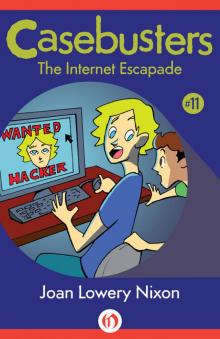 The Internet Escapade
The Internet Escapade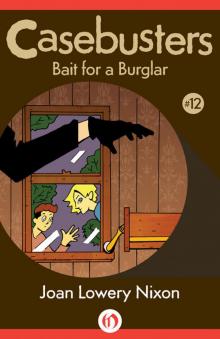 Bait for a Burglar
Bait for a Burglar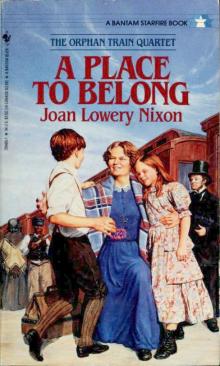 A Place to Belong
A Place to Belong Nightmare
Nightmare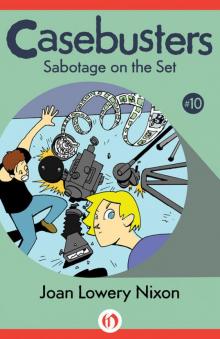 Sabotage on the Set
Sabotage on the Set The Other Side of Dark
The Other Side of Dark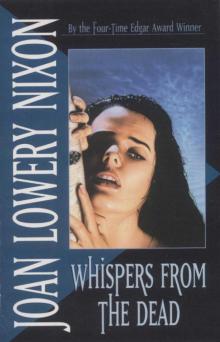 Whispers from the Dead
Whispers from the Dead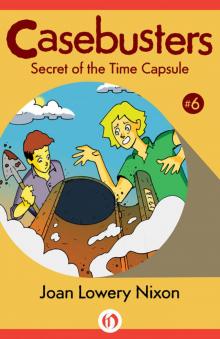 Secret of the Time Capsule
Secret of the Time Capsule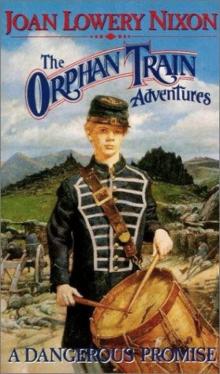 A Dangerous Promise
A Dangerous Promise Laugh Till You Cry
Laugh Till You Cry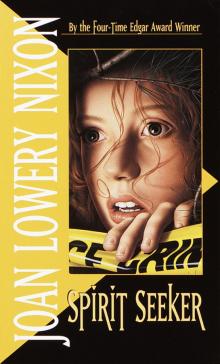 Spirit Seeker
Spirit Seeker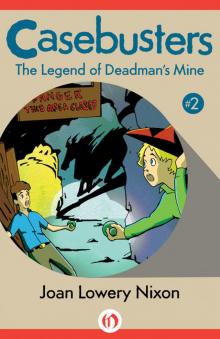 The Legend of Deadman's Mine
The Legend of Deadman's Mine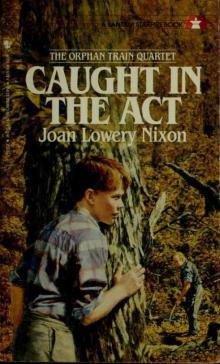 Caught in the Act
Caught in the Act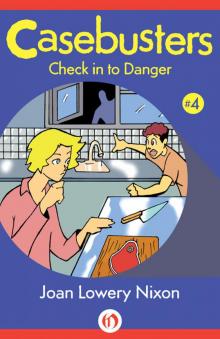 Check in to Danger
Check in to Danger Ellis Island: Three Novels
Ellis Island: Three Novels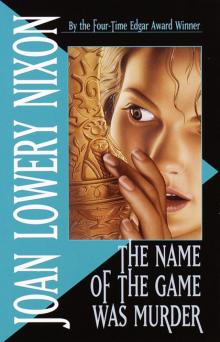 The Name of the Game Was Murder
The Name of the Game Was Murder The Haunting
The Haunting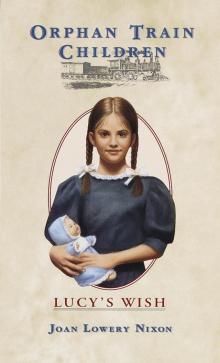 Lucy’s Wish
Lucy’s Wish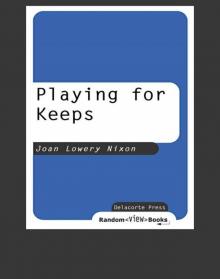 Playing for Keeps
Playing for Keeps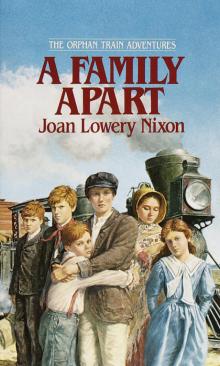 A Family Apart
A Family Apart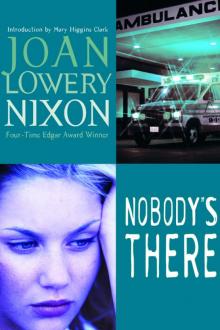 Nobody's There
Nobody's There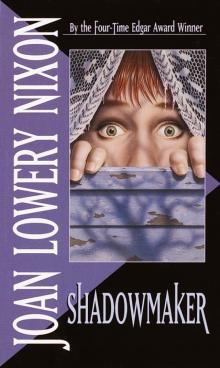 Shadowmaker
Shadowmaker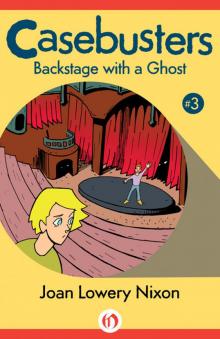 Backstage with a Ghost
Backstage with a Ghost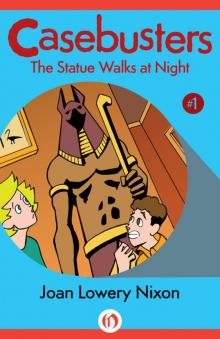 The Statue Walks at Night
The Statue Walks at Night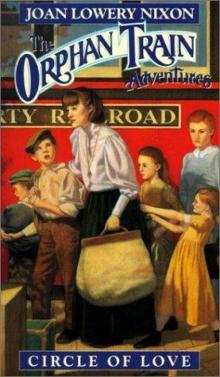 Circle of Love
Circle of Love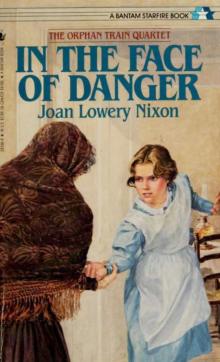 In the Face of Danger
In the Face of Danger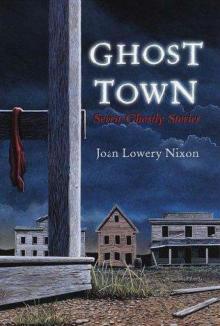 Ghost Town
Ghost Town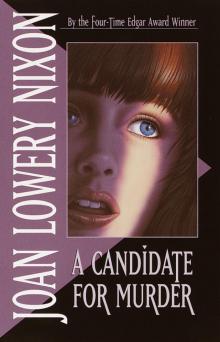 A Candidate for Murder
A Candidate for Murder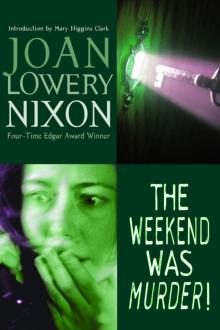 The Weekend Was Murder
The Weekend Was Murder The Island of Dangerous Dreams
The Island of Dangerous Dreams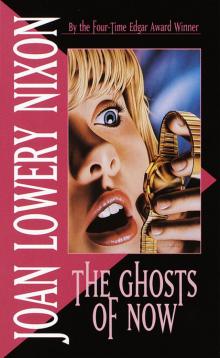 The Ghosts of Now
The Ghosts of Now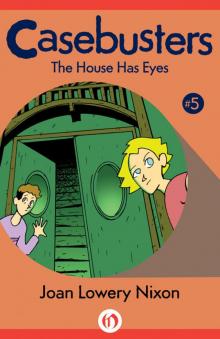 The House Has Eyes
The House Has Eyes The Dark and Deadly Pool
The Dark and Deadly Pool Keeping Secrets
Keeping Secrets Secret, Silent Screams
Secret, Silent Screams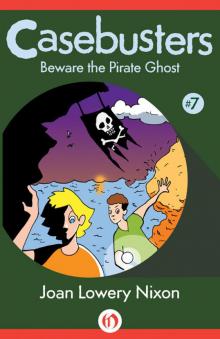 Beware the Pirate Ghost
Beware the Pirate Ghost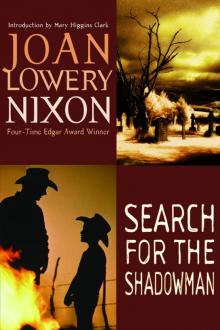 Search for the Shadowman
Search for the Shadowman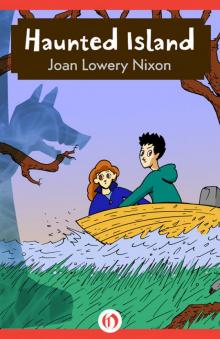 Haunted Island
Haunted Island